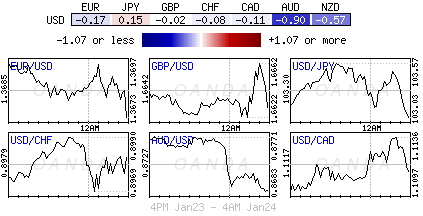Emerging markets are getting no reprieve, as investors merrily sell off any cabbage that is not Group of 10 currencies. A mixture of local and regional economic strains, weaker Chinese data, and a U.S. Federal Reserve that insists it needs to "reel in some of their monetary stimulus" is convincing investors to contemplate pulling back from making riskier bets in various asset classes. Following the financial crisis, many of the emerging market players attracted vast capital inflows, which led to strong regional growth that stoked inflation, and large current account deficits. Once the flow of capital slowed, the emerging currencies started to slide (like the INR last September). That pushed inflation higher, and in turn, forced central banks to tighten monetary policies – an action that eventually restricts growth.
Currencies like the Argentinian peso (ARS), Brazilian real (BRL), the South African rand (ZAR), and the Turkish lira (TRY) are some of the hardest hit thus far. Investors have taken cash from emerging Asian stock and bond funds for the eighth consecutive week (January 22) for a total of $1.4-billion left funds-- that’s more than twice the $671-million of the previous week. Emerging market currencies have always been vulnerable to such action. Only now as the Fed continues to trim its bond-buying fat are the flames increasingly licking away at the advantage emerging markets enjoyed in recent years to G-10 minted money.
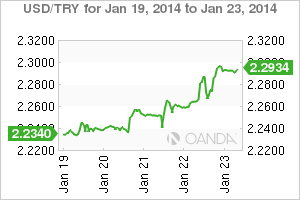 USD/TRY" title="USD/TRY" align="bottom" border="0" height="200" width="300">
USD/TRY" title="USD/TRY" align="bottom" border="0" height="200" width="300">
Turkish Central Bank Applies the Brakes
Of all emerging market currencies taking a beating, the Turkish lira has been pounded the most. The TRY managed to print new record lows against the dollar before the Turkish central bank finally decided to step up to the plate and announce earlier today that it will hold an extraordinary meeting tomorrow to evaluate the currency’s slide. This has managed to temporarily stop the lira bleed (2.3100). The upside to all this market noise is that there is finally some market volatility, which equals opportunity, something that the foreign exchange (forex) class has been dearly missing over the past 18-months.
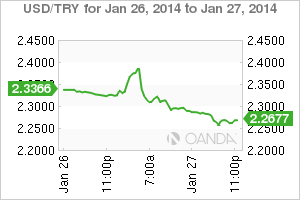 USD/TRY 2" title="USD/TRY 2" align="bottom" border="0" height="200" width="300">
USD/TRY 2" title="USD/TRY 2" align="bottom" border="0" height="200" width="300">
The question on every forex trader’s lips may well be, “will this volatility continue?” Opinion seems to be split over whether it will or not. However, with more investors beginning to deeply loath anything that is not G-10, it should support capital markets in this rout. The last Asian currency clobbering began late last summer, and it never really left us. Investors were clearly egged on by the Fed's tapering rhetoric, and by the International Monetary Fund’s (IMF) adjusted growth forecast for emerging economies. However, there are many regional contributors to this emerging currency flush-out including China's shadow banking system, the wayward politics playing out in Turkey and Argentina, and the labor strikes in South Africa, to name but a few.
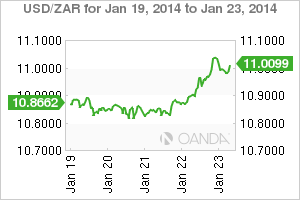 USD/ZAR" title="USD/ZAR" align="bottom" border="0" height="200" width="300">
USD/ZAR" title="USD/ZAR" align="bottom" border="0" height="200" width="300">
Markets Cautious Ahead of Fed Meeting
Investor attraction toward U.S. assets currently remains on hold. The existing global woe is failing to send cash into U.S. equities with any form of abandonment just yet. With the Fed taking its first tapering baby steps last month, it seems to be convincing many that the honeymoon period of easy money that financed most of these investments is coming to an end. Interest rates that will remain “lower for longer” may be a global central bank battle cry, but it may be a fleeting notion now that the Fed is changing tack. When central bankers outside the U.S. become concerned about the Fed's next move, it’s a strong hint that trouble is afoot. It’s rather telling that the Bank of Japan, the European Central Bank, the Bank of England, and the IMF have all recently voiced concerns about the Fed's reduction of stimulus.
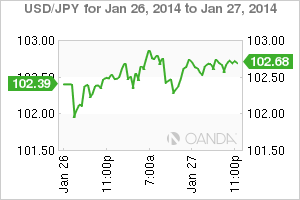 USD/JPY" title="USD/JPY" align="bottom" border="0" height="200" width="300">
USD/JPY" title="USD/JPY" align="bottom" border="0" height="200" width="300">
To be fair, the current emerging market meltdown is not solely because of the Fed. U.S. policymakers advise on only domestic economic considerations -- they are not there to please the rest of the world. Chairman Ben Bernanke and company are expected to trim the Fed’s stimulus program during this week’s Federal Open Market Committee meeting – the last one Bernanke will preside over. Last December, the Fed reduced its monthly bond-buying program by $10-billion to $65-billion. The looming end of quantitative easing has convinced investors to rethink the relative attractiveness of higher yielding emerging assets. It should also prompt investors who need to adjust their portfolios to:
1. Be aware of whether or not China can smoothly deleverage its financial sector
2. Remain vigilant to sentiment changing toward the Fed’s first interest rate hike
The most vulnerable economies will be in emerging markets with current account deficits and dwindling forex reserves. Add a political crisis for good measure and little wonder Turkey leads the emerging market pack at the moment.